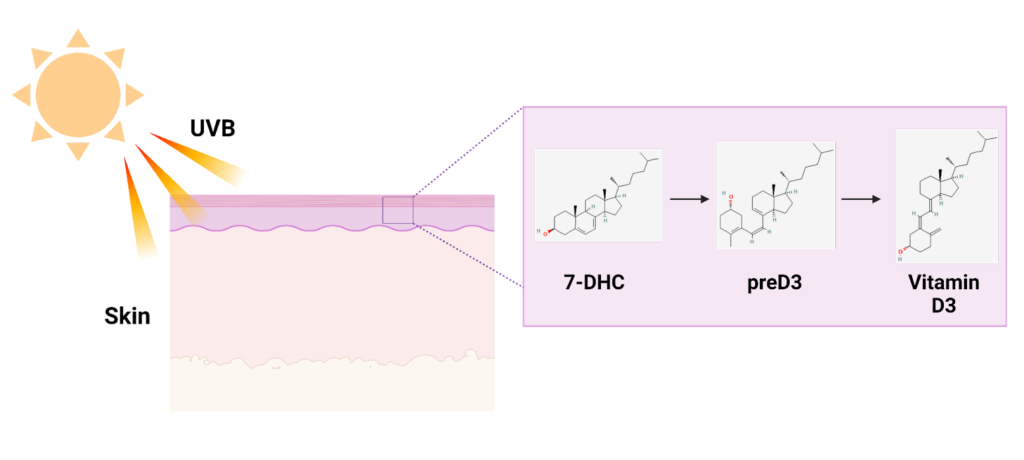by Chelsea Smith
Have you ever noticed yourself feeling happier and more energetic in summer months? Well, the increased exposure to the sun during the summer may be behind all these good feelings. Although we usually think of plants as needing sunshine to survive, we as humans need it too. Time in the sun can cause mood boosts and increased productivity, but there is also a role the sun plays that is essential for life…helping our bodies produce Vitamin D!
Vitamins are compounds necessary for life. They help our bodies function in everything from our immune system to our bones. While many vitamins are obtained from the food we eat, Vitamin D is found in a few specific foods, including tuna, beef liver, and egg yolks. It would be near impossible to obtain all of the Vitamin D our bodies need from food alone, but luckily, our bodies can generate Vitamin D with the help of the sun.
When we are in the sun, we are exposed to a type of light ray called Ultraviolet B (UVB). These rays initiate a specific reaction in our skin that produces Vitamin D. Vitamin D begins as a compound called 7-dehydrocholesterol (7-DHC). When UVB rays hit and penetrate our skin, they cause a reaction that changes 7-DHC into preD3, which then goes on to isomerize into Vitamin D3. An isomer is a compound with the same chemical formula, in a different spatial arrangement. Then, a protein called Vitamin D Binding Protein transports newly synthesized Vitamin D3 into the blood, and travels to the kidney and liver to be processed further. This reaction in our skin can actually continue for three days after sun exposure.

Image 1: UVB rays from the sun penetrate the skin, catalyzing the reaction that generates Vitamin D3. 7-DHC is transformed into an isomer of Vitamin D3, preD3, which then turns into Vitamin D3 that can be used by the body. Image generated by author in BioRender.
One of the main functions of Vitamin D in our bodies is to help our intestines absorb calcium, which is essential for proper bone health. Low levels of Vitamin D can be harmful to our health, leading to diseases such as osteomalacia, or soft bones, or a disease called rickets in children. However, signs of low Vitamin D also include fatigue, depression, and muscle weakness. Vitamin D deficiency was historically rare, but is now fairly common, with about 35% of US adults reporting low levels of Vitamin D. This is mostly due to a shift in work environments from the outdoors, such as working on farms and other manual jobs, to most people working indoors in office spaces.
Although too much time in the sun can lead to negative outcomes like skin cancer, the sun can also really help us to be healthy. We need time in the sun for our bodies to not just survive, but to function optimally…turns out we’re a little more like plants than we may have originally thought!
